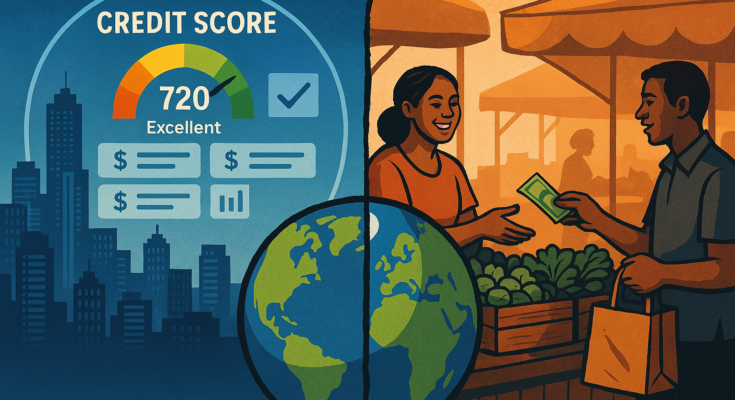Credit Systems Unveiled: A Global Perspective on Trust, Access, and Financial Evolution
Imagine a world where your ability to buy a home, start a business, or even rent an apartment hinges on an invisible number—your creditworthiness. This intangible metric shapes economies and lives worldwide, yet its mechanics vary dramatically between nations. Let’s explore the multifaceted world of credit, from bustling Wall Street banks to small-town markets, and uncover how trust in financial systems differs across the globe.
What Is Credit?
Credit is the financial trust placed in individuals, businesses, or governments to fulfill monetary obligations. It’s the backbone of modern economies, enabling everything from personal loans to international trade. Here’s how it manifests:
- Bank Credit: Loans or financial facilities granted by banks, based on a borrower’s repayment capacity.
- Credit Cards: Tools for deferred payments, allowing purchases now with repayment later.
- Credit Scores: Numerical assessments of creditworthiness, influencing loan approvals and interest rates.
- Commercial Credit: Trade agreements where goods/services are delivered upfront, with payment deferred.
Developed vs. Developing Nations: A Credit Divide
1. Bank Credit: Speed vs. Scrutiny
- Developed Countries (e.g., U.S., Germany, Canada):
- Easy Access: Streamlined digital systems evaluate creditworthiness swiftly, using algorithms and vast data pools.
- Low Interest Rates: Stable economies and reliable repayment histories keep borrowing costs low.
- Digital-first Processes: Apply for loans online—no endless bank visits required.
- Developing Countries (e.g., Egypt, India, Morocco):
- Stringent Requirements: Banks demand collateral (property, steady income) due to limited credit data.
- High Interest Rates: Lenders hike rates to offset risks of defaults in volatile economies.
- Bureaucratic Hurdles: Paperwork and in-person approvals slow down access.
2. Credit Cards: Convenience vs. Caution
- Developed Nations:
- Ubiquitous Use: Cards are lifestyle staples, offering cashback, travel insurance, and fraud protection.
- Tech-driven Security: AI monitors transactions for suspicious activity, and contactless payments reign.
- Developing Nations:
- Elite Privilege: Cards often cater to high earners or formal-sector workers.
- Limited Acceptance: Many vendors prefer cash, and perks are scarce.
- Security Gaps: Fraud risks deter widespread adoption.
3. Credit Scores: Transparency vs. Uncertainty
- Developed Systems:
- Standardized Metrics: FICO scores (U.S.) or Equifax reports (Canada) dictate financial opportunities.
- Life Impact: Scores affect housing rentals, job prospects, and loan terms.
- Consumer Empowerment: Free annual reports and dispute rights keep systems fair.
- Developing Systems:
- Fragmented Data: Scattered bank records replace centralized scoring.
- Subjective Decisions: Loans hinge on personal connections or collateral, not data.
- Emerging Frameworks: Countries like India are building national credit registries, but progress is slow.
4. Commercial Credit: Contracts vs. Handshakes
- Developed Economies:
- Legal Frameworks: Invoices and payment terms are legally binding, backed by agencies like Dun & Bradstreet.
- Digital Integration: Automated systems track receivables and manage corporate credit risk.
- Developing Economies:
- Cash Dominance: Businesses prefer upfront payments to avoid defaults.
- Trust-based Trade: Deals rely on personal relationships rather than formal ratings.
Why This Divide Matters
Credit systems mirror a nation’s economic maturity. In developed countries, they fuel growth, innovation, and consumer confidence. In developing regions, limited access stifles entrepreneurship and perpetuates inequality. Bridging this gap requires:
- Digital Infrastructure: Expanding credit databases and fintech solutions.
- Financial Literacy: Educating citizens on credit management.
- Policy Reforms: Encouraging transparency and investor-friendly regulations.


